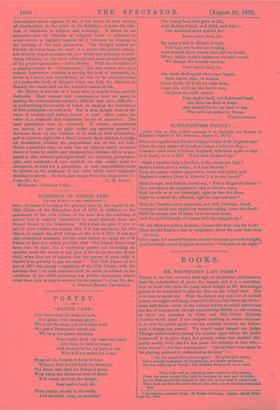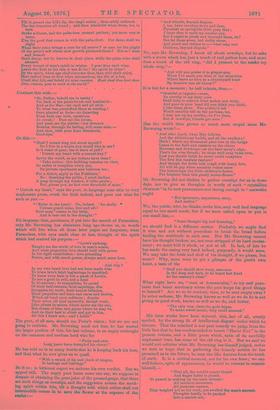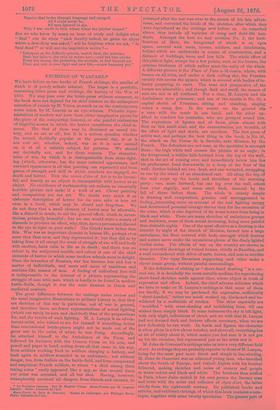BOOKS.
MR. BROWNING'S LAST POEM.*
THERE is, we fear, no. more fatal sign of intellectual deterioration than the substitution of scorn for reason, and it is a mortifica- tion to those who have for years taken delight in Mr. Browning's genius to be compelled to kiss the dust on his behalf now. But it is time to speak out. Were the failure any real loss of mental power, we might well keep sorrowful silence, but there are lines— some half-dozen—even in the volume before us which prove that the fire of true genius, though smouldering fitfully, is not extinct, as there are passages in Fifine and Red- Cotton Nightcap Country which equal if not surpass anything in earlier volumes. It is over the poet's spirit, over his attitude towards his fellow- men, a change has passed. We would make himself the judge. Though unfortunately among the number upon whom the poet's housemaid is to pour slops, the present writer has studied dili- gently nearly every day for ten years the writings of him who— must we say ?—has been a great poet. "As he bent once again to his playing, pursued it unchecked as he sang " :— " Oh, our manhood's prime vigour No spirit feels waste,
Not a muscle is stopped in its playing, nor sinew unbraced. Oh, the wild joys of living I the leaping from rook up to rock.
Thou dost well in rejecting mere comforts that spring From the mere mortal life, held in common by man and by brute: In our flesh grows the branch of this life, in our soul it bears fruit. Thou hest marked the slow rise of the tree,—how its stem tremble(' first
Pacchiarotto; and other Poems. By Robert Browning. London: Smith, Elder, and Co. 1878.
Till it passed the kid's lip, the stag's antler ; then safely outburst The fan-branches all round ; and thou mindedst when these, too, in turn Broke a-bloom, and the palm-tree seemed perfect; yet more was to learn, E'en the good that comes in with the palm-fruit. Our dates shall we slight When their juice brings a cure for all sorrow? or care for the plight Of the palm's self whose slow growth produced them ? Not so! stem and branch Shall decay, nor be known in their place, while the palm-wine shall staunch Every wound of man's spirit in winter. I pour thee such wine. Leave the flesh to the fate it was fit for! the spirit be thine! By the spirit, when age shall o'ercome thee, thou still shalt enjoy, More indeed than at first when unconscious, the life of a boy. Crush that lift, and behold its wine running. Each deed thou host done Dies, revives, goes to work in the world."
Contrast this with :— " So, Father, behold me in sanity
I'm back to the paint-brush and mallstick : And as for Man—let each and all stick To what was prescribed them at starting !
Once planted as fools—no departing
From fools one inch, seculorum In seecula I Pass me the jorum,
And push me the platter—my stomach
Retains, through its fasting, still some ache,— And then, with your kind Benedicite,
Good-bye."
Or this :— " Shall I sonnet sing you about myself ?
Do I live in a house you would like to see?
Is it scant of gear, has it store of pelt? 'Unlock ray heart with a sonnet-key ?'
Invite the world, as my betters have done?
'Take notice: this building remains on view, Its suites of reception every one, Its private apartment and bedroom too ; For a ticket, apply to the Publisher.'
No: thanking the public, I must decline.
A peep through my window, if folks prefer; But, please you, no foot over threshold of mine."
"Unlock my heart," says the poet, in language near akin to very unpleasant prose, crush the fruit indeed, and pour out wine for such as you :—
", Enter in the heart.' No, indeed. 'Its shelly
Cuirass guard mine, fore and aft! Such song 'enters in the belly, And is cast out in the draught."
Fit language that, perchance, if put into the mouth of Paracelsus, only Mr. Browning has elsewhere long ago shown us, in words which will live when all these later pages are forgotten, what Paracelsns, with eyes made clear at last, thought of the spirit which had marred his purpose :—
" Love's undoing,
Taught me the worth of love in man's estate, And what proportion love should hold with power In his right constitution: love preceding Power, and with much power, always much more love.
And why ?
In my own heart love had not been made wise To trace love's faint beginnings in mankind.
To know even hate is but a mask of Love's, To see a good in evil, and a hope In ill-success; to sympathise, be proud Of their half-reasons, faint-aspirings, dim Struggles for truth, their honest fallacies, Their prejudice and fears and cares and doubts,
Which all touch upon nobleness ; despite
Their error, all tend upwardly, though weak, Like plants in mines, which never see the sun, But dream of him, and guess where he may be, And do their beat to climb and get to him, All this I knew not,—and I failed."
The poet, of all men, should see Peter's vision ; but we are not going to criticise. Mr. Browning need not fear, he has wasted the larger portion of this, his last volume, in an angry onslaught on the common and unclean herd who for
"Forty-and-over
Long years have trampled his clover."
He has told us in so many words that he is keeping back his beat, and that what he now gives us to quaff,
"With a smack of lip and cluck of tongue, Is leakage and leavings."
Be it so ; in bitterest regret we endorse his own verdict. But we appeal still. The angry poet hears some one say, we suppose in despair of obtaining the pure juice of the pressed grape, that there are such things as cowslips, and the suggestion rouses the mock- ing spirit within him, till a thought with which critics shall not intermeddle comes in to save the flower at the expense of the
reader:—
" And friends, beyond dispute
I, too, have cowslips dewy and dear, Punctual as springtide forth peep they ; I leave them to make my meadow gay. But I ought to pluck and impound them, eh? Not let them alone, but deftly shear, And shred and reduce to—what may suit Children, beyond dispute."
No, says Mr. Browning, I know all about cowslips, but he asks with a scorn which has just a touch of real pathos here, and more than a touch of the old ring, "did I present to the reader my whole crop,"— " And will you prefer it to ginger-pop, When I've made you wine of the memories Which leave as bare as a churchyard tomb My meadow late all bloom?"
It is but for a moment ; he half relents, then,— " Grateful or ingrate—none,
No cowslip of my fairy crew Shall help to concoct what makes you wink, And goes to your head till you think you think, I like them alive. The printer's ink Would sensibly tell on the perfume, too.
I may use up my nettles, ere I've done, But of cowslips, friends got none."
Has the world then grown so much more stupid since Mr. Browning wrote?—
" And after April, when May follows, And the whitethroat builds, and all the swallows! Hark ! where my blossomed pear-tree in the hedge Leans to the field and scatters on the clover Blossoms and dewdrops—at the bent spray's edge, That's the wise thrush ; he sings each song twice over, Lest you should think he never could recapture The first fine careless rapture!
And though the fields look rough with hoary dew, All will be gay when noontide wakes anew The buttercups, the little children's dower, Far brighter than this gaudy melon-flower."
Mr. Browning did not disdain to gather cowslips for us in those days, nor to give us thoughts in words of such "crystalline- clearness "as he now pronounces not strong enough to " enswathe- aught
"But ignorance, impudence, envy, And malice."
We, the public, who, he thinks, revile him, may well find language- equal to our small needs, but if we were called upon to put in one small line,—
" Some thought big and bouncing," we should find it a different matter. Probably we might find' it wise and not without precedent to break the bread before feeding the multitude in such case. But Mr. Browning cannot have his thought broken, no, not even stripped of its hard encase- ment; we must bolt it whole, or not at all. In fact, of late he has made the casing very hard indeed, purposely, it would seem. We may take the husk and shell of his thought, if we please, but- more ? Why, more were to get a glimpse of the poet's own heart, a taste of the
"Stuff you should stow away, ensconce
In the deep and dark, to be found fast fixed At the century's close."
What right have we, "man or homunculus," to try and pene- trate that inner sanctuary where the poet keeps his good things to himself? Are we to be content, then, to be sent empty away ? In sober sadness, Mr. Browning knows as well as we do he is not giving us good work, knows as well as we do, and better,
"The only way, since the gods began
To make sweet music, they could succeed."
His later works have been injured, this, last of all, utterly spoiled, by the strong fit of intellectual disgust under which he labours. That the mischief is not past remedy we judge from the little fact that he has condescended to insert "Herve Rio!" in the present volume, and a little poem which, spite of its morbidly unpleasant tone, has some of the old ring in it. But we said we would not criticise what Mr. Browning has himself judged, rather we wait in hope that in gathering the homely nettles he has promised us in the future, he may rise like Antreus from the touch of earth. It is a critical moment, not for his own fame ; we can, well believe, spite of appearances, be would be content to console- himself,—
" That all, the world's coarse thumb And finger failed to plumb, So passed in making up the main account: All instincts immature, All purposes unsure,
That weighed not as his work, yet swelled the man's amount. Thoughts hardly to be packed
Into a narrow act, Fancies that broke through language and escaped.
All I could never be, All men ignored in me, This, I was worth to God, whose wheel the pitcher shaped."
But we who know by many an hour of study and delight what " Saul" can do when "each faculty tasked, he gains an abyss where a dew-drop was asked," will be forgiven when we ask, "Is Saul dead ?" or will not the inspiration revive ?—
" Interpose at the difficult minute, snatch Saul, the mistake, Saul, the failure, the rain he seems now,—and bid him awake From the dream, the probation, the prelude, to find himself set Clear and safe in new light and new life,—anew harmony yet."




































 Previous page
Previous page